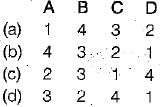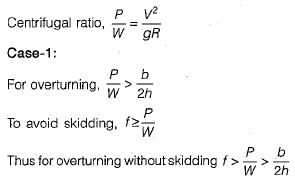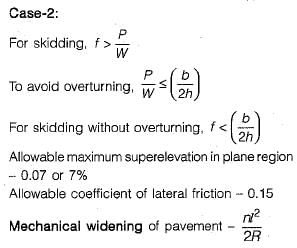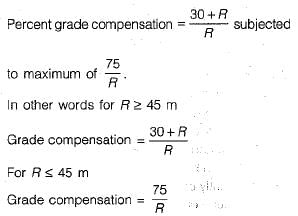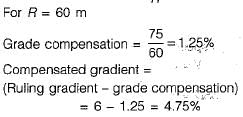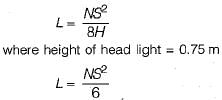Test: Highway Geometric Design - 3 - Civil Engineering (CE) MCQ
20 Questions MCQ Test - Test: Highway Geometric Design - 3
If an ascending gradient of 1 in 50 meets another ascending gradient of 1 in 30 then the deviation angle is
The relationship between the length (L) and radius (r) of an ideal transition curve is given by
| 1 Crore+ students have signed up on EduRev. Have you? Download the App |
Width Of carriage way for a single lane is recommended to be
Stopping sight distance is the minimum distance available on a highway which is the
The design value of lateral friction coefficient on highway is
Camber on highway pavement is provided to take care of
In the limiting case of overturning while traversing a simple circular curve by a vehicle, pressure below
The tandwidth required across the alignment of road is
Stopping sight distance on a national highway at a descending gradient of 2% is where V = 80 km/h
Which one of the following pairs is correctly matched? (Notations have their usual meaning)
The compensated gradient provided at the curve of radius 60 m with a ruling gradient of 6 percent is:
if N is the algebraic difference of grades, S is the headlight sight distance in metres, then the transmission length of a valley curve (following standard codes) should roughly be equal to
The design speed of a highway is 80 km per hour. Assuming other data as per IRC recommendations, which one of the following is the approximate adopted lag distance?
Consider the following steps involved in the design of super elevation in practice as recommended by IRC :
1. Calculation of the allowable speed for maximum ‘e’ and design value of T
2. Calculation of the super elevation for 75% of the design speed
3. Calculation of the value of ‘e’ and recheck
4. Calculation of the value of ‘f and recheck
The correct sequence of these steps is
In highway geometric design, cumulative speed distribution is drawn and the design in checked at which and the design in checked at which percentile?
Which one of the, following is taken in to consideration while determining overtaking sight distance in a two lane highway
Match List-I (Type of road) with List-ll (Recommended camber) and select the correct answer by using the codes given below the lists:
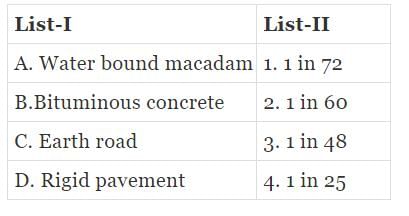
Codes:
